If you spend enough time in Old Port, the sound of seagulls becomes white noise, occasionally punctuated by a ship full of tourists announcing its arrival. They’re all here in Portland, Maine—birds and humans alike—for the food. But there’s more to this New England city than its renowned, award-winning culinary scene. When the snow melts each year, the population swells as Portland draws visitors by land and sea to its quaint cobblestone streets and salted summer air to taste and touch and try on things made locally.
Portland is the “just right” between some of New England’s more quiescent parts and Boston, a city 10 times its size. And, small business owners offer even more reasons for tourists to stick around: I stayed at a homey B&B in West End, then consumed tapas and jazz on Congress Street before strolling along its densely packed blocks of eateries, bars, and vintage shops. In Old Port, I took in the 19th century architecture and lifestyle stores before sitting down for a “Lumbersexual” cocktail at Vena’s Fizz House.
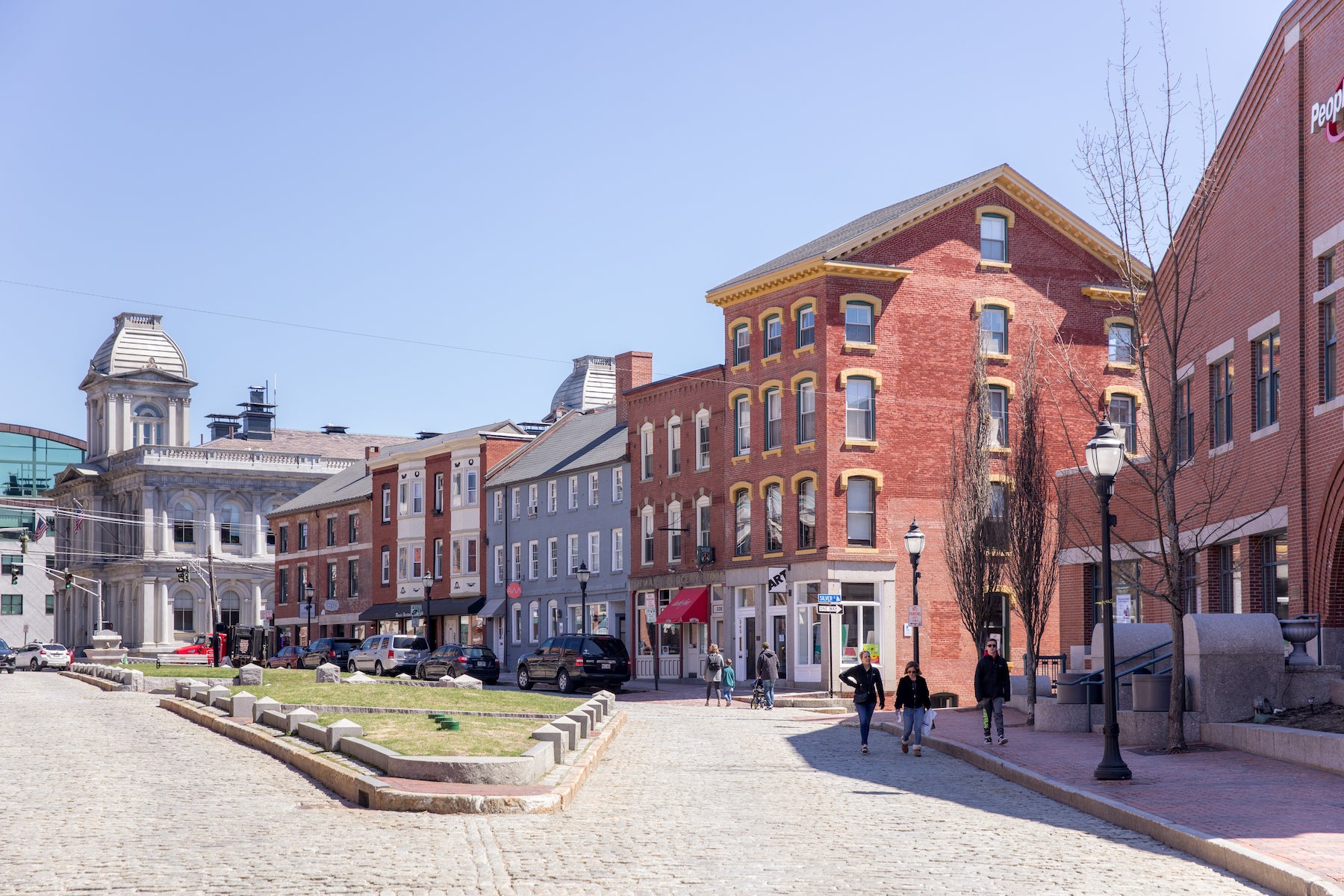
Local shop owner Johanna Corman says she feels supported by the entrepreneurial community, and it’s clear that the city celebrates small business, but some warn that rents have become expensive here. It’s hard to employ good people for that reason, says Brant & Cochran co-founder, Mark Ferguson. His business is part of Maine Outdoor Brands, an organization dedicated in part to raising the profile of the state and attracting young people to work—and move—here.
Despite the challenges, Portland continues to attract makers and chefs, brewers and artists, and the entrepreneurial-minded. We spoke to six creatives on both sides of the Bay to learn why they do business in Portland, Maine, and nowhere else.
The unlikely bartenders
Vena’s Fizz House isn’t your typical bar: it closes no later than 11 pm each night. That’s because Johanna and Steve Corman opened their first business together—an emporium for all things cocktail that’s one part bar and one part retail store—when they were both in their 50s. “I can’t stay up,” Johanna says. “When we first started, we were like, ‘We’re too old for that.’”
The move came after Steve lost his teaching job due to education budget cuts. At the same time, Johanna noticed that drinks in food mags were gorgeous, but she had no idea how to find half of the ingredients in Portland. And, there was a gap in the area’s robust food and drink offerings: cocktail bars. “We never made drinks in our life,” says Johanna. “But, we’d both been teachers—we’re good at learning and researching.”
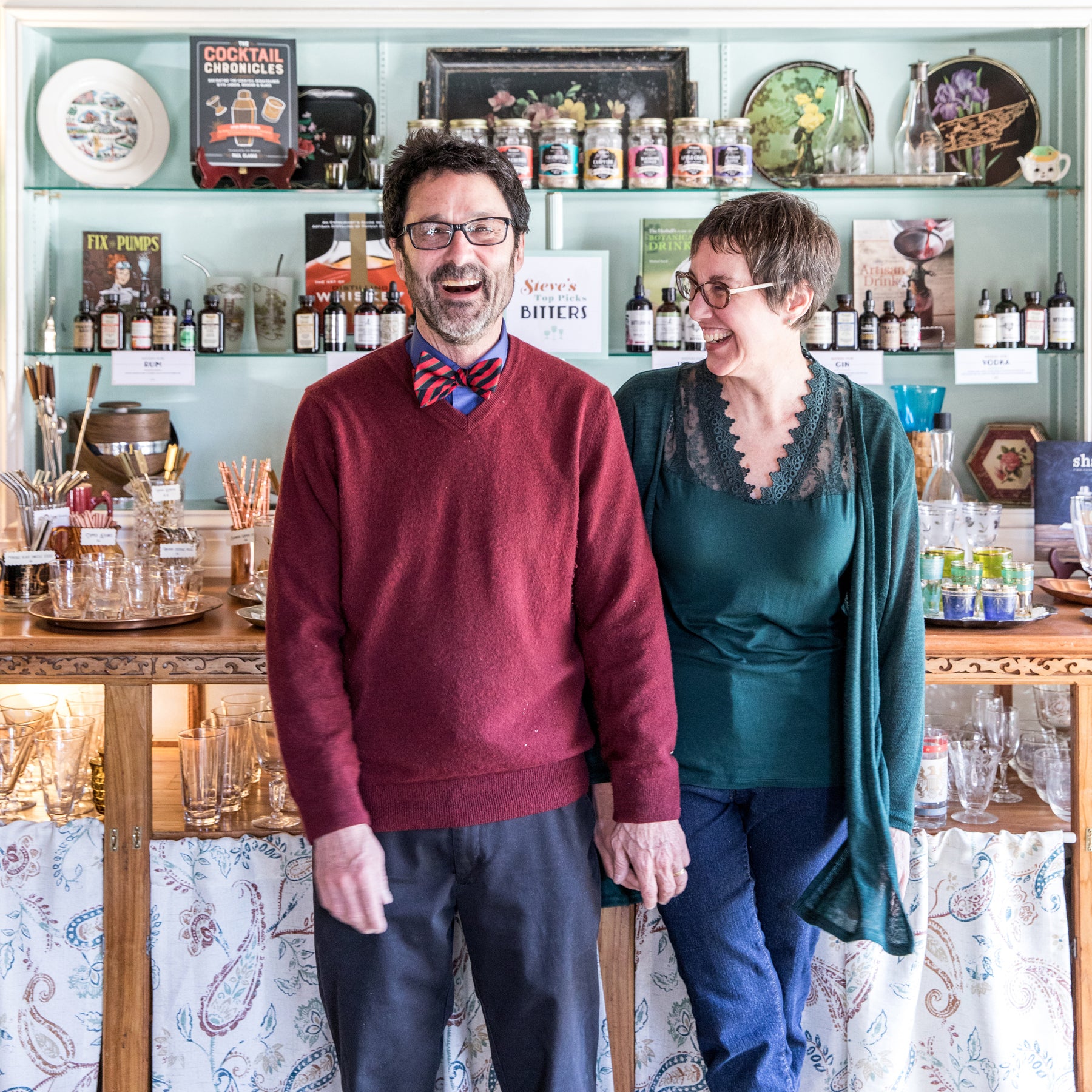
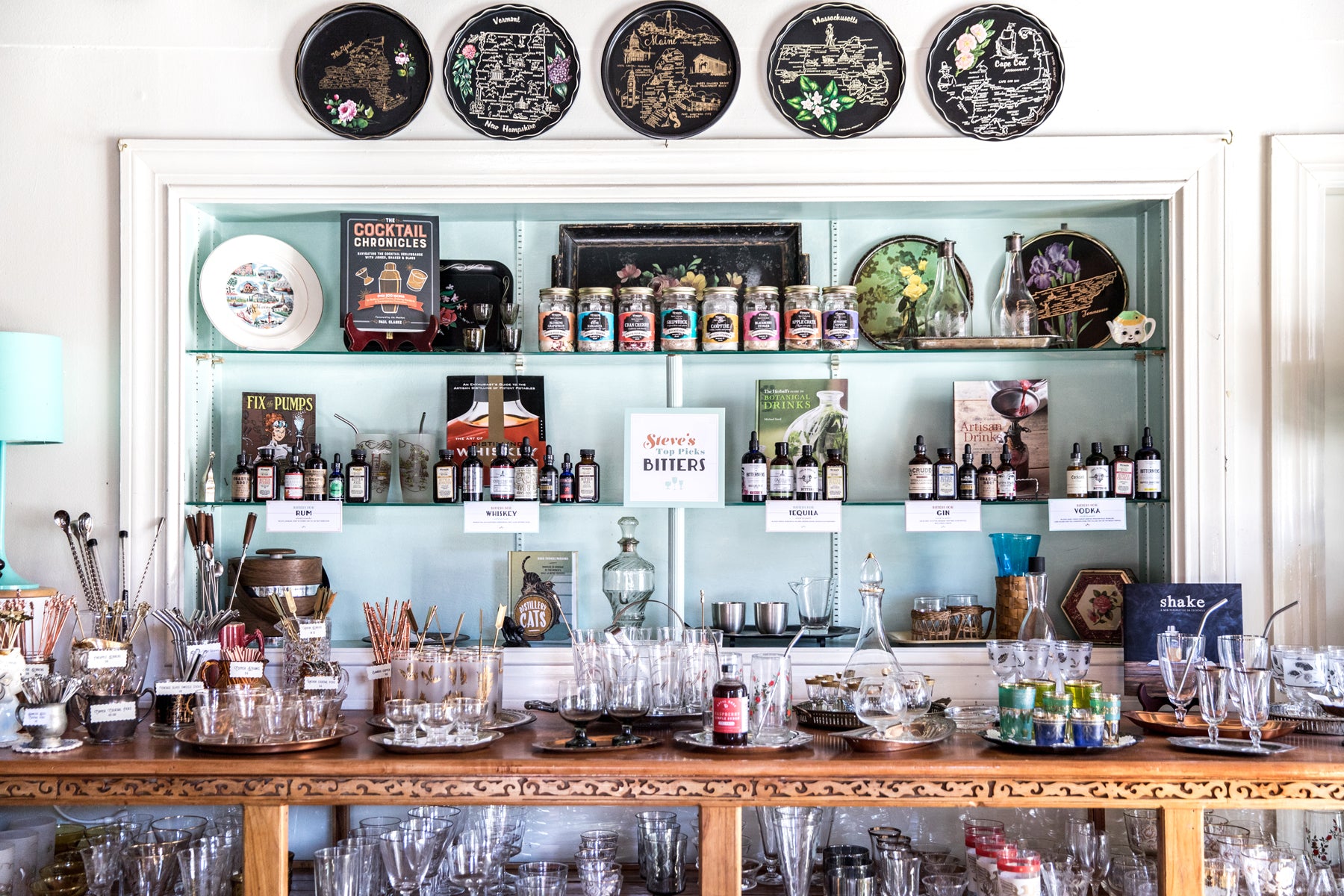

We pinch ourselves every day. It’s something we never, ever would have imagined in a million years.
Though she had never been a business owner before opening Vena’s, Johanna says she’s always had an entrepreneurial spirit and a knack for developing products. While working on her family’s apple farm decades earlier, she concocted an apple syrup to save unsold cider from going to waste. That syrup would eventually inspire a Vena’s cocktail. “[It was] our very first drink, and it’s still on the menu,” Johanna says.
Despite the challenges of opening a bar with no experience, Vena’s will celebrate its sixth year in business in 2019. “We pinch ourselves every day,” says Johanna. “It’s something we never, ever would have imagined in a million years.”
Portland’s style king
Though Portland Trading Co., with its gorgeous curation and bang-on soundtrack, is an experience for all of your senses, its owner, Kazeem Lawal, is the first thing you notice. His sharp sense of style—influenced by all the places he’s lived before, including New York City and Nigeria—is distinctly his own. He immediately urges me to try on a jumpsuit, one from Portland Trading Co.’s own line. It’s made right here in Maine, he tells me, just like nearly every other garment in the shop.
Kazeem’s downtown shop is a mashup of lifestyle finds, select vintage pieces, and tasteful Maine-themed goods (like locally made Brant & Cochran axes), but his eye for fashion really makes the space shine. He breaks our conversation to joke with a teenage customer rifling through impressive stacks of LPs. “You’re too young for those,” he says. “Oh, and they’re not for sale.”

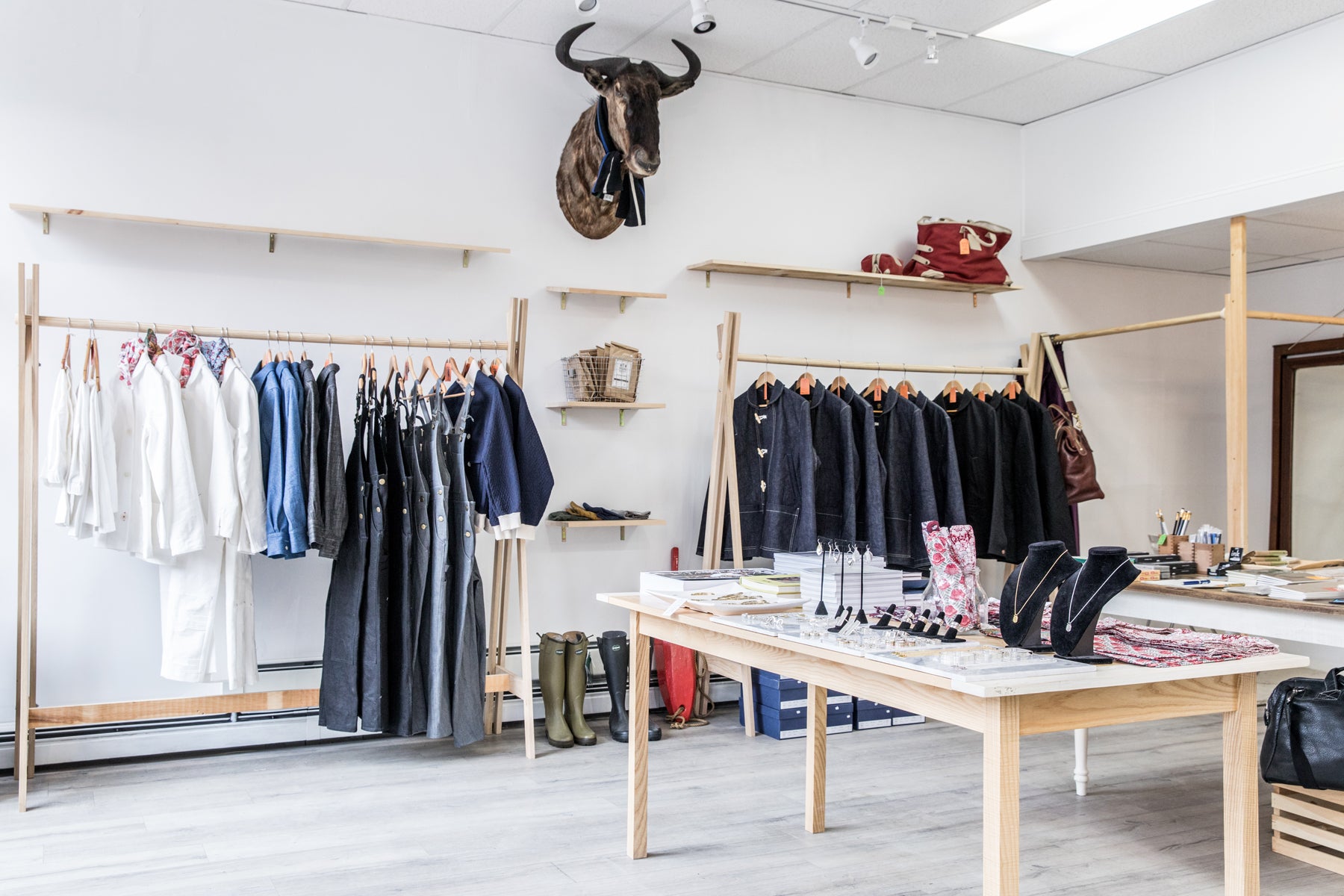
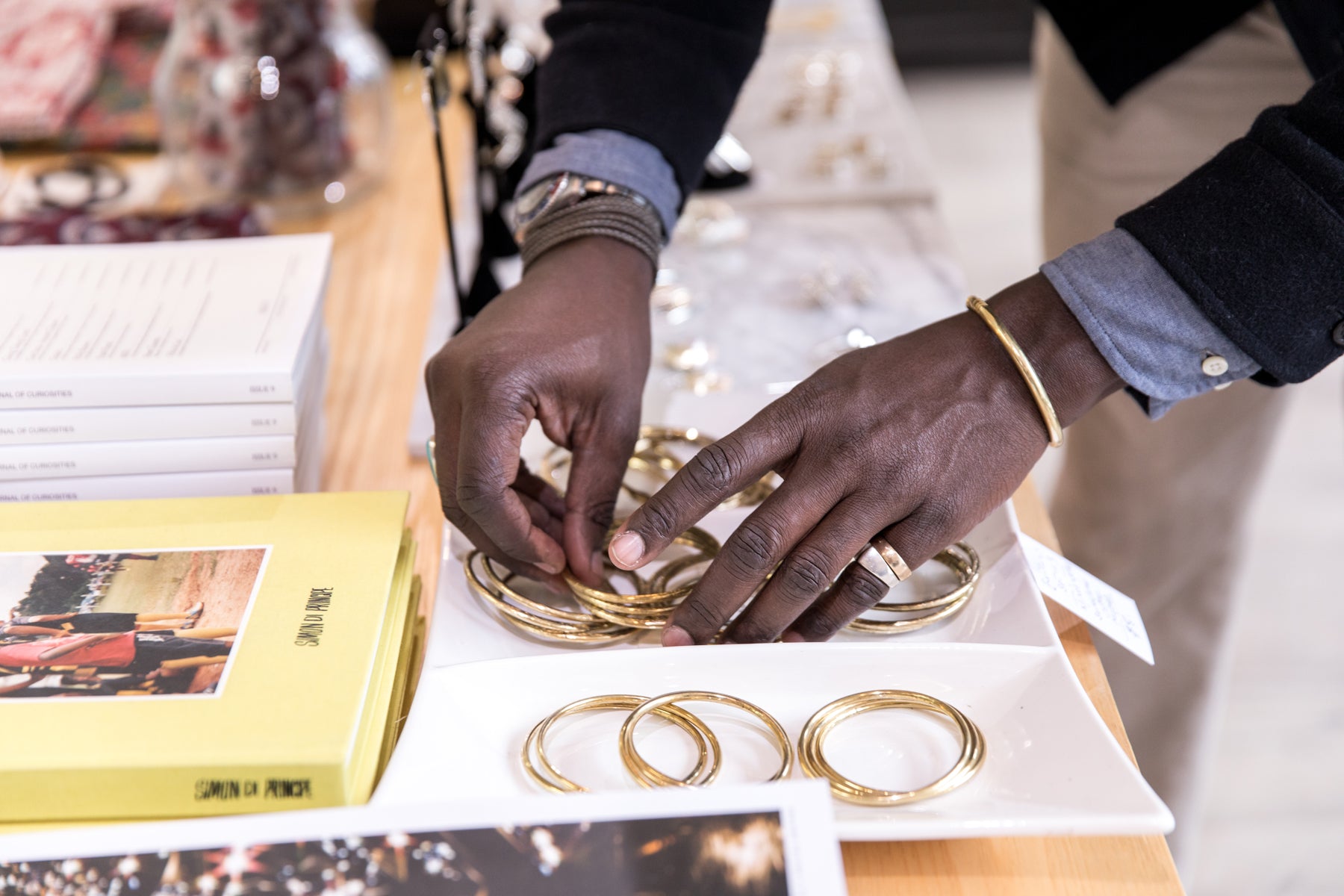
A slower kind of life
Jeff Lauzier taught in inner city Boston before his school was rezoned and started admitting suburban kids. His impetus for leaving teaching? “I realized I hated parents,” Jeff says. In 2001, he left Boston for a slower life, just 40 minutes outside Portland, and became a partner at Joseph’s, an upscale menswear shop in Old Port. Ten years later, Jeff began experimenting with screen printing, launching what would become Loyal Citizen as a side hustle run out of Joseph’s. “I’m a hands-on guy,” he says.
A nod to New England pride and Jeff’s interest in history, Loyal Citizen is known for its T-shirts featuring nautical designs, Maine heritage, and political figures of the past—all still printed by hand in Jeff’s basement. In 2015, he and his partners, Julian Redman and Brock Foreman, decided to launch a pop-up, testing the brand’s viability in a retail setting. In just two months, they made $50,000. “We couldn’t print fast enough, and we actually ran out of product,” says Jeff. “[That made us] realize there was probably a market for what we wanted to do.”
This business was a side project that kind of morphed into something greater.
Loyal Citizen moved to a dedicated space that same year, just down the street from Joseph’s, where they expanded to carry prints, locally made bags, and beard balm (the latter also made by hand by Jeff). In 2018, Jeff says he and the team were already starting to question the physical location, as rents soared in the area. If the store moved to a street with better foot traffic, the rent would double. “And that’s a lot of T-shirts [to sell],” Jeff says. Since my visit in the summer of 2018, and four years after opening its doors, Loyal Citizen closed its retail operation to focus on its online store.
A self-professed control-freak, Jeff still has his hands in many aspects of the business, balanced with his hours at Joseph’s and time for his family. “If I get five hours of sleep a night, that’s a lot,” he says. But Loyal Citizen is also his creative outlet. “This business was a side project that kind of morphed into something greater,” he says. “I’m not going to retire anytime soon.”
“What do you do for fun?” I ask.
“Print T-shirts,” Jeff says.
Coffee with a cause
Mike Mwenedata moved to Portland in 2010 and says he was drawn here by “the eclectic group of artists and talented people.” He met Nick Mazuroski at a Portland gym in 2013, and the two discussed their shared interests in sustainability and helping others. An idea began to form: they would combine their resources—Nick’s background in business and renewable energy and Mike’s connection to his native Rwanda—to build a better farm-to-cup coffee model. “Growing up, I knew we had good coffee,” says Mike, “but I always saw people were poor in the coffee farms.”
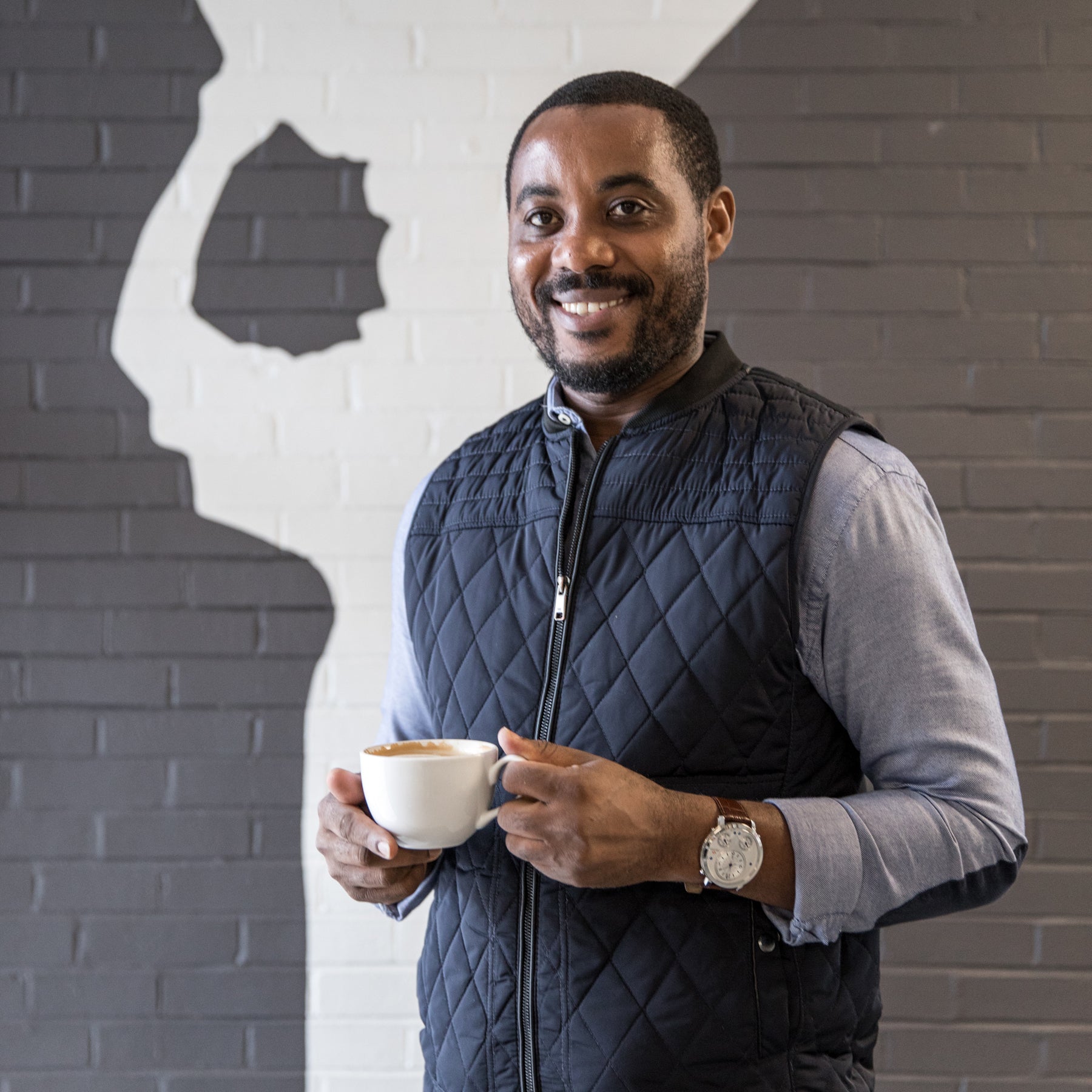

The resulting business, Rwanda Bean, sources its beans from Mike’s home country, providing not only fair wages, but also investing half of its profits into enriching the lives of coffee farmers. So far, they’ve provided health insurance for more than 1500 farmers and have contributed to water projects.
In 2018, Rwanda Bean launched as a café in South Portland—which also serves as the company’s packing and distribution center—and soon after opened their second location in Deering Center. “We’ve been really fortunate to have a great network here,” Nick says of their community in Maine. That network helps businesses like theirs stay afloat in the colder, slower months says Mike. “We are locally driven and survive by supporting one another.”
Where land meets sea
While working in marketing and advertising in New York in the early aughts, Lisa began dabbling with fragrances in her kitchen. The experiment led her to developing men’s grooming products before the industry took off. “I knew nothing about the skin-care business,” she says, but in 2007, while moving from Brooklyn to Portland, she started selling her products through an online marketplace. Portland General Store, named for her new home, was born.
In the early days of the business, Lisa ran every element of Portland General herself, with the help of her business savvy partner—from the couple’s town house. “Everything was bootstrapped,” she says. She balanced being a mom of young children with full-time nursing school and all of the demands of her growing small business. When it started to take over the entire kitchen, she knew something had to give. “[We were] using somebody else’s driveway to drop off the pallets,” she says. “It was just a nightmare.”
I was in the right place at the right time, because it was just before the whole heritage, small batch, American-made movement.
Lisa eventually left nursing school to run her business full-time, and the brand graduated from a marketplace to its own dedicated online store. In 2012, she moved operations into an industrial building in Old Port. That location, where Portland General still stands today, is one part manufacturing space and one part retail shop, thanks to its street-level frontage with huge windows. Lisa says she owes her success to timing: “I was in the right place at the right time, because it was just before the whole heritage, small batch, American-made movement.”
Today, men’s grooming is huge—it’s expected to grow into a $78.6 billion industry by 2023—and Lisa’s business snagged its slice of the pie early on. “And men, if they find something and it works, they stick to it,” she says. “They don’t want to be bothered with hunting around.” In 2019, Portland General made a bold move to rebrand after more than a decade in business to better reflect the brand’s current customer. The gender-agnostic Land Meets Sea launched in its place, still focused on small-batch, Maine-inspired fragrances, skin care, and body products.
Bringing axes back
Across Casco Bay in South Portland, former lawyer and software company founder Mark Ferguson took a hard left from a typical retirement route and learned a new trade: making axes. After his brother, Steve, tried to find an American-made axe for his godson (but couldn’t),Mark launched Brant & Cochran with both Steve (a school psychologist) and their friend Barry Worthing (a former ER nurse). At the time, Mark says, no one was really making axes domestically. He and his brother, though, had toolmaking in their blood and named the brand for a business their grandfather owned in the 1970s.
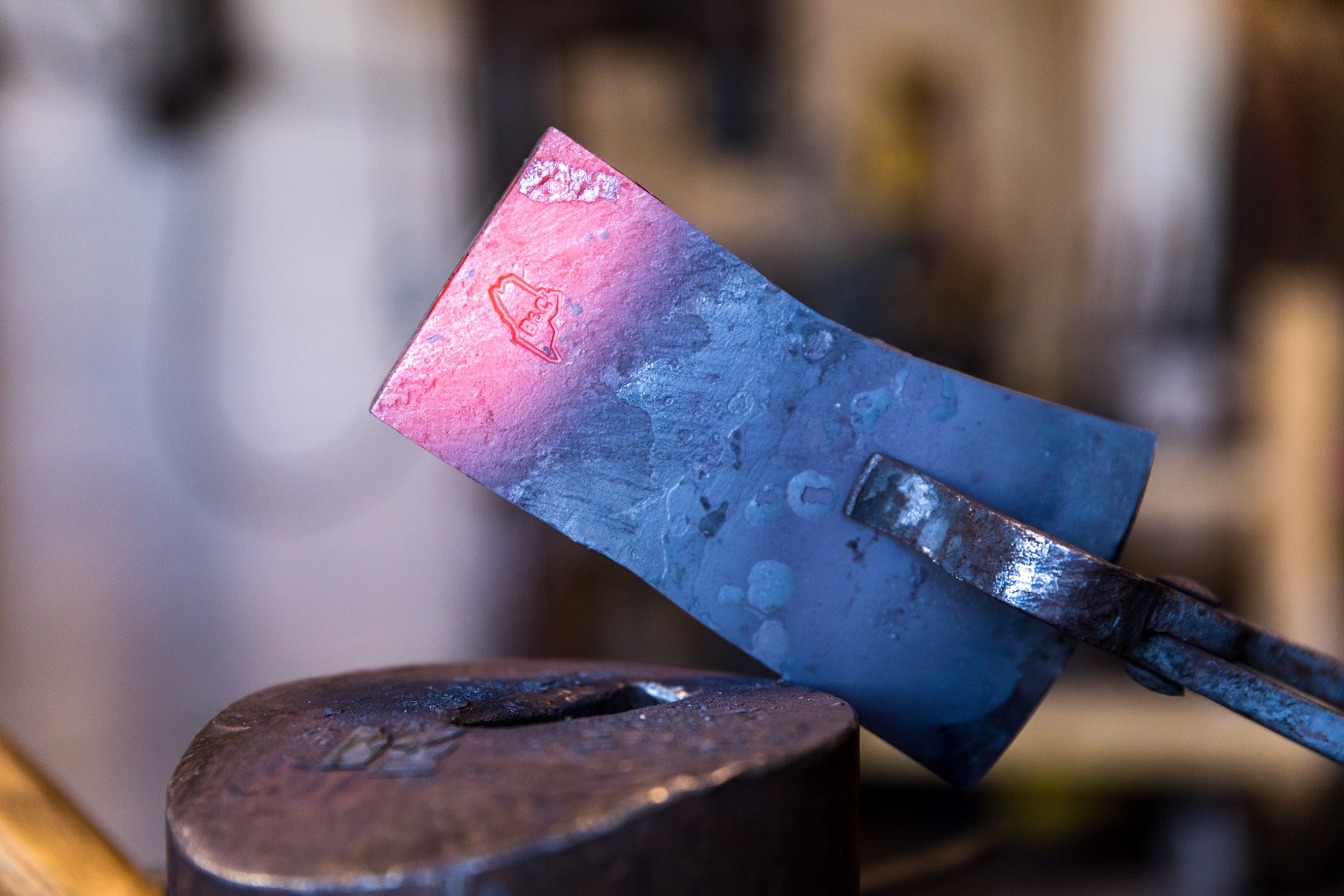
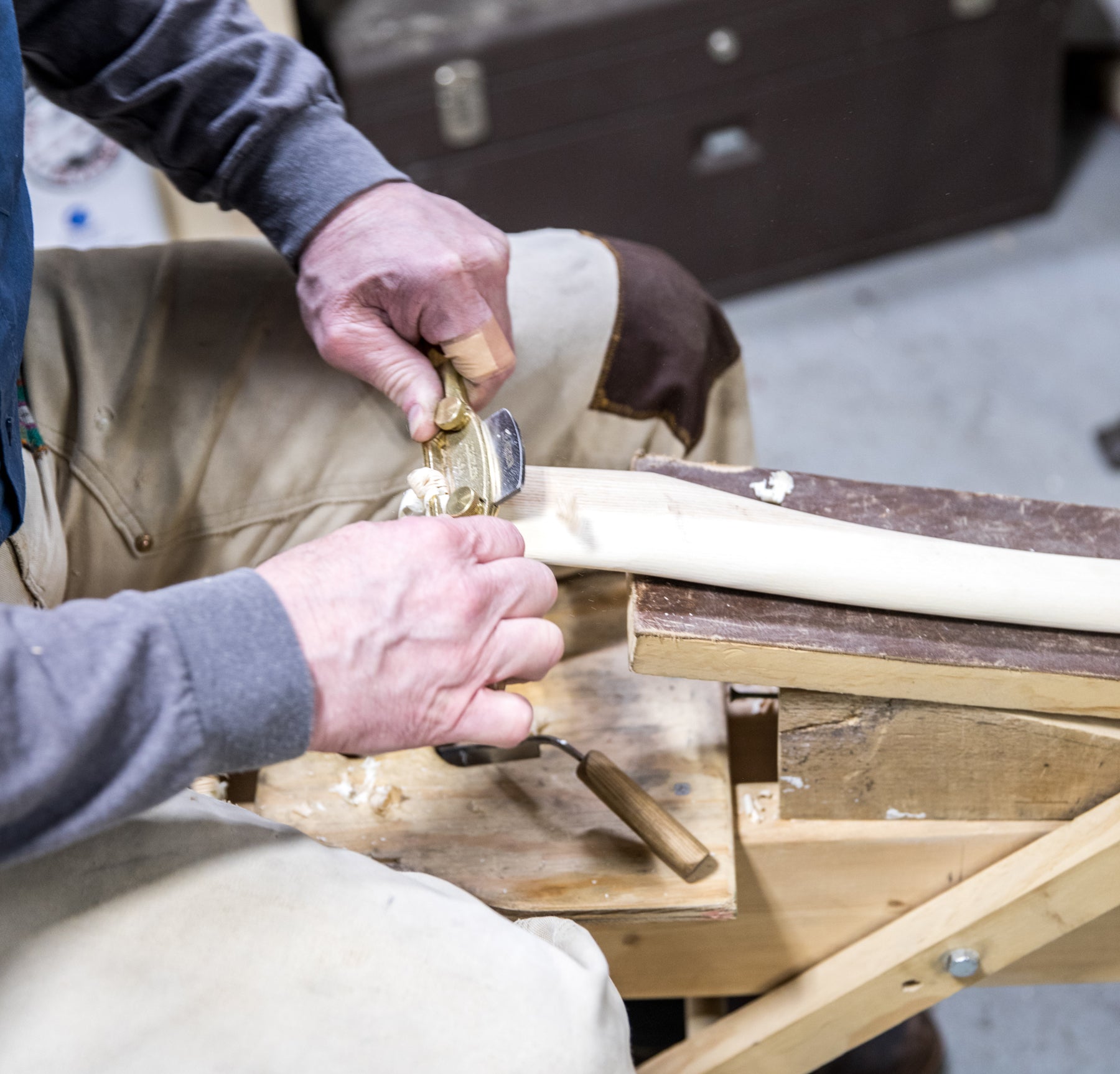

The trio got started in a makerspace, restoring old axes to get a feel for the craft, before moving into their current workshop—awash in rock posters, a velvet Elvis painting, and vintage axe memorabilia—where they manufacture their own products now. They raised $27,000 in a crowdfunding campaign that helped them afford that space and purchase new equipment. Their signature camp axe is based on an original pattern traditionally made in Maine and is the only one of its kind currently forged locally, Mark says. Each is stamped with the year it was made and the temperer’s initials. “It’s an homage to the old makers,” says Mark.
Brant & Cochran is supported by a younger generation who Mark says knows the value of spending $250 on an axe because of its story and craftsmanship, rather than buying a $45 version at a chain store. The men are still trying to understand their customer, though “[we’re] learning as we go,” says Mark. In 2019, Mark plans to start manufacturing his own handles, expand his line of Maine-made axes, and move Brant & Cochran to a larger production space. “The goal is to have something in your hand that feels good at the end of the day,” says Mark. “We’re not gonna make a bazillion dollars doing this.”
The goal is to have something in your hand that feels good at the end of the day.
Meanwhile, they’re learning from some of their biggest supporters: Their sister, for one, suggested that Brant & Cochran’s marketing didn’t appeal to women and helped take photos of herself using the axe on camping trips. Mark’s response? “[I was] like ‘that's pretty smart, Karen—for a little sister.’”
Feature image by Verónica Grech
